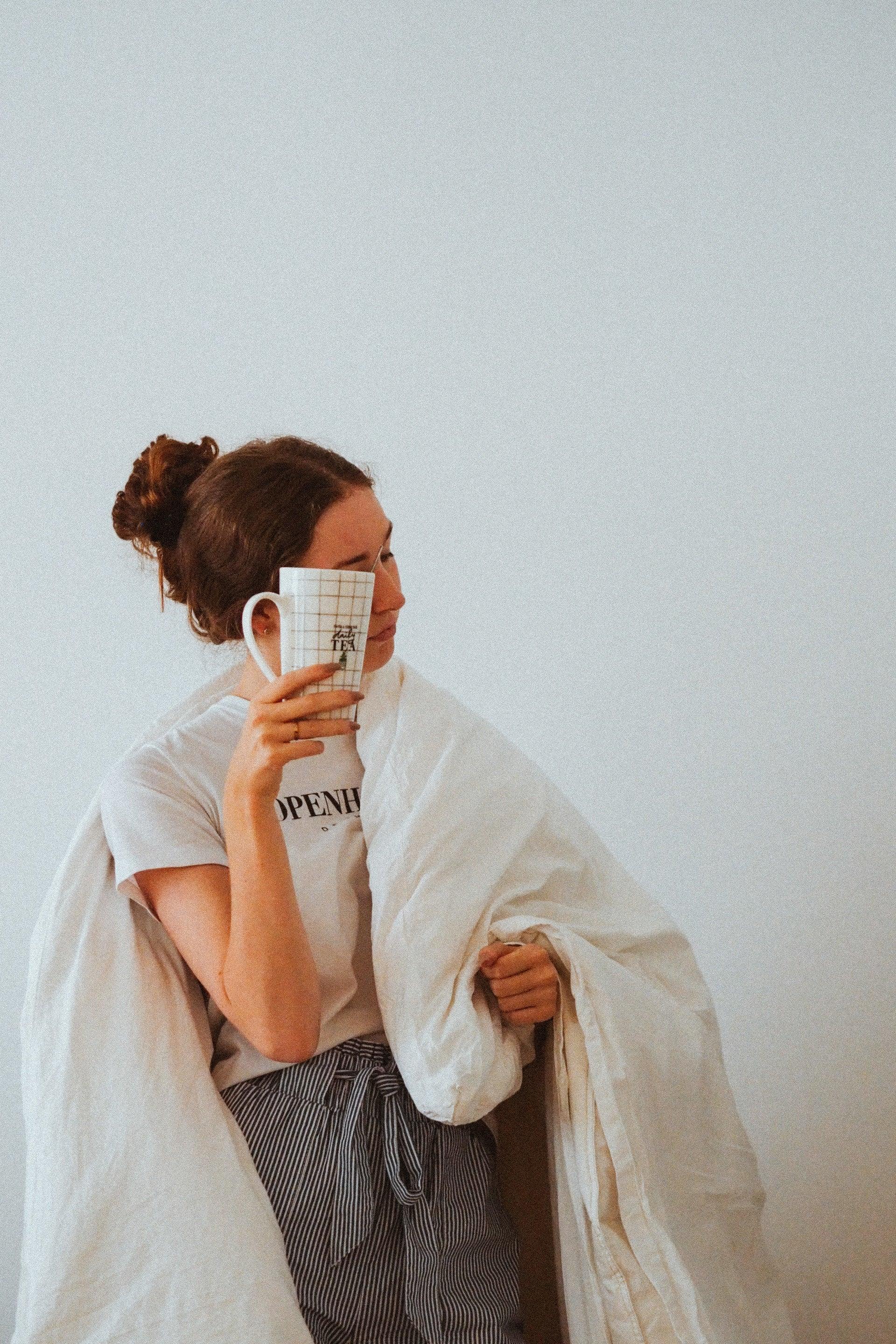Introduction
If this blog title resonated with you, you and I are going through the exact same issues and I'm excited to talk to you about it.
Although my sleep app reports that I'm "meeting my sleep goals," I often wake up feeling groggy and lacking energy. After some research, I discovered that the problem may not be the amount of sleep I'm getting, but rather the quality of sleep. In this blog, we'll explore the different types of sleep, why they're important, and how we can improve our sleep to wake up feeling refreshed and ready for the day (and night) ahead.
I'm in this with you.
There are three different types of sleep stages.
Sleep is divided into three stages: Non-REM, REM, and deep sleep.
Non-REM sleep is the first stage of sleep. During this stage, the body undergoes physical restoration processes, including the release of growth hormones and repairing and rejuvenation of tissues.
REM sleep is the second stage and is characterized by rapid eye movement, increased brain activity, and vivid dreaming. During REM sleep, the body undergoes mental restoration and emotional regulation, as well as the consolidation of certain types of memories.
Deep sleep is the third stage of sleep characterized by slow brain waves, decreased heart and breathing rate, and lower body temperature. During deep sleep, the body experiences physical restoration, including the repair and growth of tissues, release of growth hormone, and consolidation of memories.
In this blog, I'll focus heavily on deep sleep since it plays a vital role in feeling rejuvenated and rested in the morning. For healthy adults, deep sleep should account for 13-25% of your sleep cycle. If you're sleeping for over eight hours and still feel tired, chances are you're not getting enough deep sleep.
I realized that I was sleeping 8+ hours a night but still feeling exhausted because I wasn't getting enough deep sleep.
The image below is my own sleep data from my apple watch. I never benchmarked or understood what those numbers meant until diving in a bit more. As you can see, my average deep sleep percentage over the last couple of months is 10%, which is below the 13-25%. On a week-to-week basis, it's been around 8% lately.
Through my sleep data and personal observations, I have attributed my poor sleep to a couple key main factors:
- High stress and anxiety
- Too much screen time
- Poor habits around self-care
Continue reading to see all the tips I've implemented for myself.
Deep sleep is incredibly important for overall health, energy, and function.
Deep sleep is important for many things, including memory and learning. It's also vital for the immune system, healing and growth/development. If you're not sleeping enough to get deep sleep (or if your body isn't getting enough recovery time between periods of deep sleep), it can lead to, but not limited to:
- Challenges concentrating
- A feeling of burnout
- Memory problems
-
Depression and anxiety
Here are 10 ways to improve your deep sleep:
I started Inoki Bathhouse because I was at my lowest mental health state and needed a remedy for my chronic insomnia and depression. Although the baths have helped me recover from insomnia and numerous mental health issues, my sleep is still not optimal. Here are the 10 things I'm currently doing to improve my sleep quality.
- Stick to a consistent sleep schedule: Sticking to a strict sleep schedule can help regulate your body's natural sleep-wake cycle and improve the quality of your sleep. Going to bed and waking up at the same time every day, even on weekends, can help train your body to fall asleep and wake up more easily. By establishing a consistent sleep routine, you may be able to improve the quality of your sleep and wake up feeling more rested and refreshed.
- Don't use your bed for anything other than sleep and sex: Using your bed only for sleep and sex can help train your brain to associate your bed with these activities, making it easier to fall asleep and stay asleep. When you use your bed for other activities, such as work or watching TV, your brain may become confused and not associate your bed with sleep. By creating a sleep-conducive environment, you may be able to improve the quality of your sleep and wake up feeling more rested and refreshed.
- Create a relaxing sleep environment: Make sure your bedroom is cool, dark, and quiet. Use comfortable bedding and pillows, and remove any distractions such as electronic devices. The ideal sleep temperature is 65 degrees Fahrenheit - your body temperature drops during deep sleep so having your room colder allows your body to be more comfortably ease into deep sleep.
- Take a warm, aromatherapy bath: A 30+ minute bath has been scientifically proven to support sleep quality. According to a meta-analysis of 17 studies, taking a bath in water with a temperature between 104 and 108.5 degrees Fahrenheit in the evening can enhance the quality of sleep. Furthermore, individuals who take a bath one to two hours before going to bed tend to fall asleep more quickly. The reason why baths help with sleep is because it calms the mind (you're away from the screen, in a meditative state) and it cools down your internal temperature by drawing your internal heat to the surface of your body.
- Avoid caffeine and alcohol: Caffeine can interfere with sleep, so try to avoid drinking coffee, tea, or other caffeinated beverages in the afternoon and evening (7+ hours before you sleep). Similarly, alcohol can disrupt sleep patterns and should be avoided before bedtime. I've been trying to cut caffeine all-together and trying to stick with drinking tea first thing in the morning.
- Get regular exercise: Regular physical activity can help you fall asleep faster and improve the quality of your sleep, including deep sleep. However, avoid exercising too close to bedtime, as this can have the opposite effect (at least 3-4 hours beforehand). I personally started working out 5 times a week for 30 minutes to 1 hour, and it's helped my sleep quality and energy significantly.
- Practice regular relaxation techniques: Meditation can improve sleep quality by promoting relaxation, reducing stress and anxiety, reducing symptoms of insomnia, improving focus, and reducing the need for medication. By incorporating meditation into your daily routine, you may find that you sleep more soundly and wake up feeling more rested and refreshed. There are a ton of apps that help you facilitate a sense of calm, such as Headspace and Calm.
- Manage stress: Stress and anxiety can interfere with sleep, so consider incorporating relaxation techniques (point #7) or writing down all of your stressful thoughts before bedtime. Recently, I have started to avoid looking at my phone notifications first thing when waking up because I realized when I wake up I feel a sense of panic and it's because I'm anticipating stress right away from looking at all my emails, to-dos, and notifications.
- Avoid eating before bed: Eating before bed can disrupt sleep, increase heartburn and acid reflux, interrupt digestion, impact metabolism, and affect hormone levels, leading to weight gain, food cravings, and other health problems. When I am feeling really snacky or hungry, I try to munch on some vegetables so it's not overbearing for my digestive system.
- No screens before bedtime: Looking at a screen before bed (30 minutes to 1 hour beforehand) can disrupt sleep by suppressing the production of melatonin, a hormone that regulates sleep, and by stimulating the brain, making it more difficult to fall asleep and stay asleep. I try to read before bed now.
Bonus Tip (because saying "11 tips" sounds odd):
- Get enough sunlight/vitamin D during the day: Getting enough sunlight during the day helps regulate your circadian rhythm, which controls your sleep-wake cycle. Exposure to sunlight during the day can help you feel more alert and awake, while lack of sunlight can disrupt your sleep and cause sleep disturbances. By spending time outside during the day and exposing yourself to natural light, you may be able to improve the quality of your sleep at night. To enhance this, you can also try Vitamin D supplements (have a talk with your doctor first on dosage).
Conclusion
Getting enough sleep is important, but it's not the only thing that matters. You also need to make sure you're getting quality sleep. If you're feeling tired and not getting enough deep sleep at night, try some of these tips. They may help give you more energy during the day.
Although Inoki Bathhouse is not just about helping people recover from sleep challenges, this was the original reason why I started this company and created relaxing tea bath experiences. Our baths include a meditation practitioner guiding you through a relaxing and mindful visualization exercise and a tea bath to create a multi-sensory aromatherapeutic experience. The only thing I recommend is not drinking the tea we provide at night time. Instead, save the tea pairing for the morning to feel refreshed.




Leave a comment